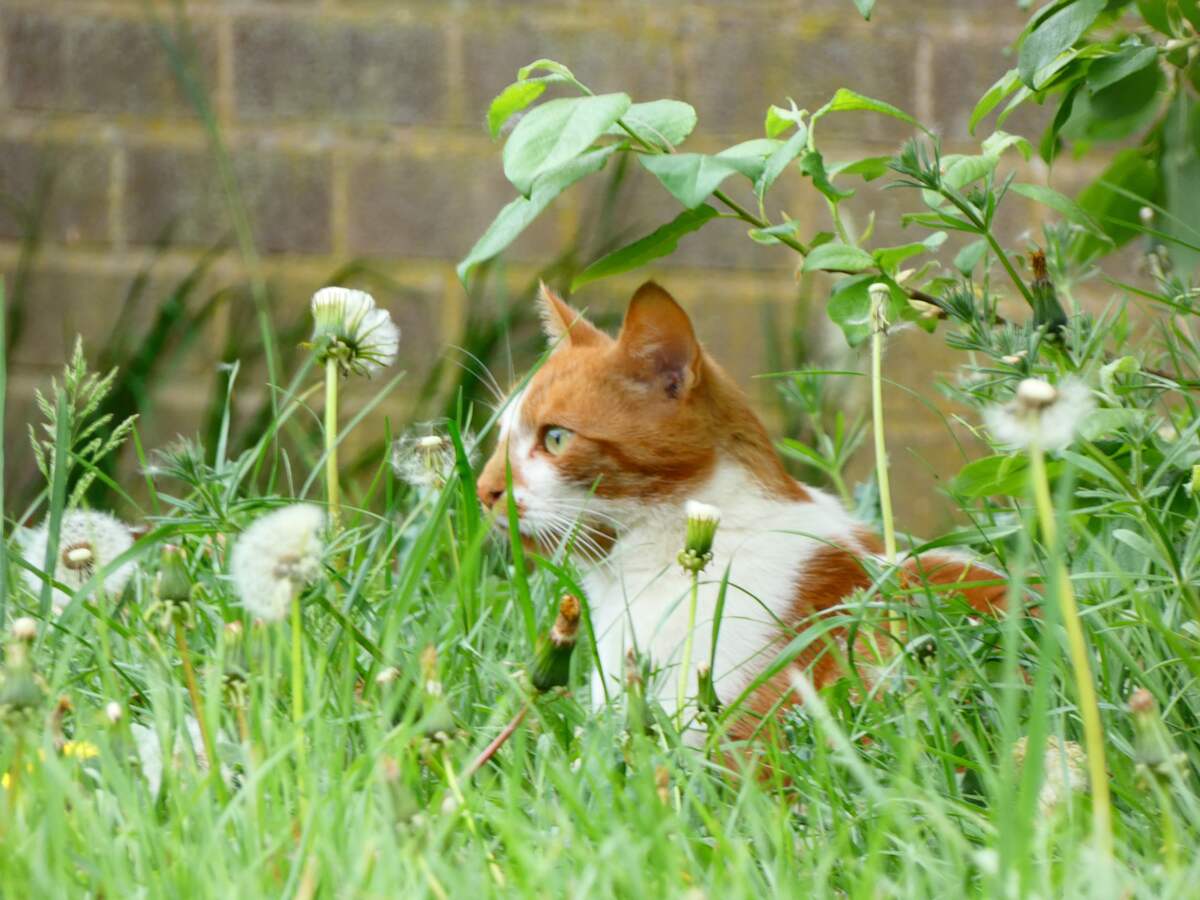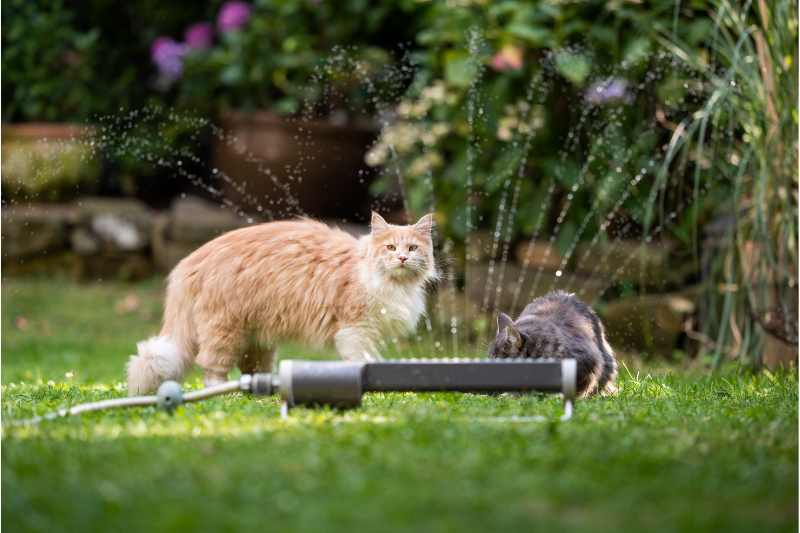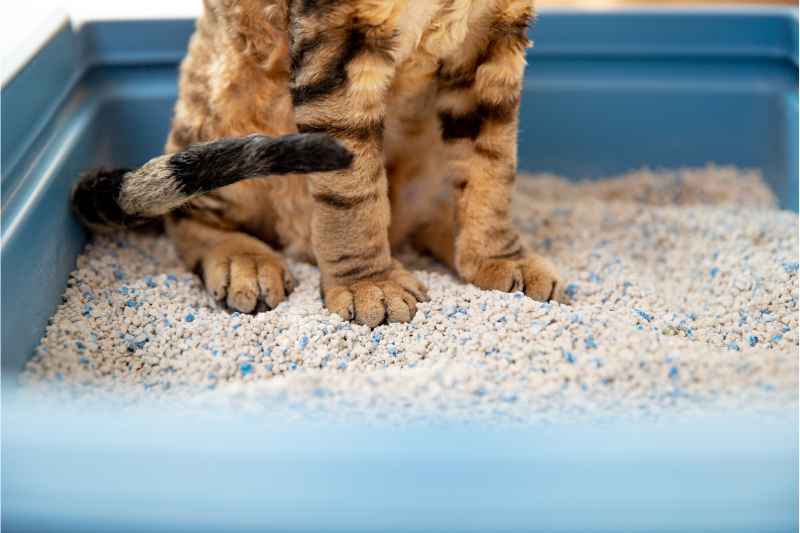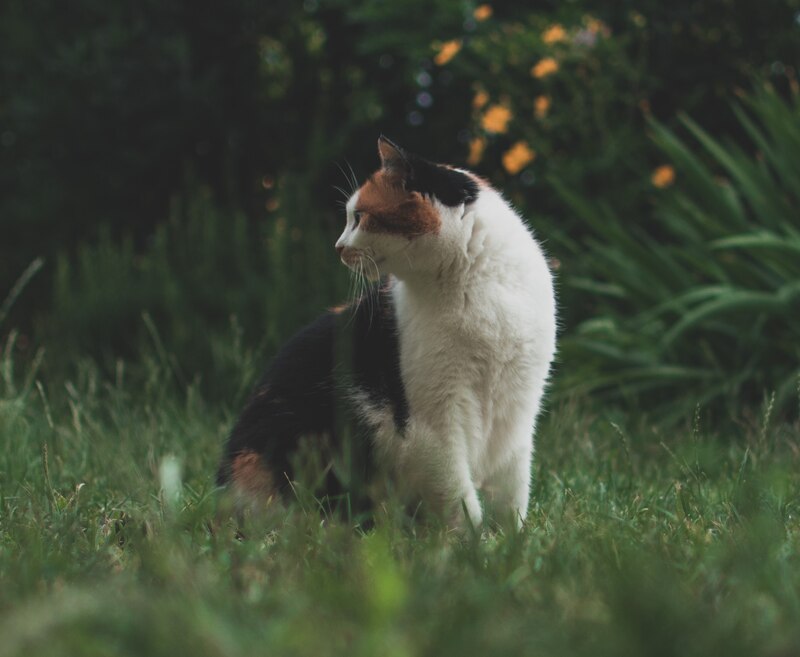
They love your yard. But they lounge on your freshly cut grass, dig in your flower beds (leaving gifts for you in the dirt), and stalk the areas around the bird feeders. Outdoor cats can take over your lawn space. So, how do you keep cats out of your yard? From installing cat-repellent plants to setting up motion-activated sprinklers, we’ve got you covered in this article.
We’ve got 11 ideas on how to keep stray cats away so you can keep your vegetable or flower gardens intact.
- Indoor vs. Outdoor Cats
- How to Get Rid of Cats in Your Yard
- 1. Spray Essential Oils, Spices, and Other Scents
- 2. Use Citrus Peels and Coffee Grounds
- 3. Install Plants as Repellents
- 4. Spread “Pointy” Mulch or Chicken Wire
- 5. Sprinkle Predator Urine
- 6. Employ Ultrasonic Animal Repellents
- 7. Make Use of Motion-Activated Sprinklers
- 8. Hang Aluminum Foil and Other Noisemakers
- 9. Put up a Tall Fence or Attach Fence Toppers
- 10. Create an Outdoor Litter Box
- 11. Get Rid of What Attracts Cats to Your Yard
- FAQ
Indoor vs. Outdoor Cats
Cats used to live completely outdoors and helped reduce the rodent population around farms, homes, and businesses. But then, someone invented kitty litter, and the rest is history. Cats became, for the most part, “inside” pets.
But purely “outside” cats remain:
- Cats with homes: Some owners allow their cats to live outside for most of the year.
- Stray cats: Then there are stray cats (socialized to humans) that may live within communities and call no one house their home.
- Feral cats: A clowder (group) of feral cats (not socialized to humans) that call no home their own can roam your neighborhood, using your yard and garden as litter boxes or places to dig holes to hide or defecate in.
How to Get Rid of Cats in Your Yard
Not all solutions work for all cats. You might have to try a different scent, sound, or tactile device before finding something that works for you. A combination of these ideas might work like a charm.
If you’re wondering “How to keep cats out of my yard?” worry no more: Here are 11 ways to deter cats from your yard.
1. Spray Essential Oils, Spices, and Other Scents

Spraying garden beds with essential oils mixed with water and other ingredients can keep cats away from your yard. Or sprinkle the herbs on your vegetable or flower beds. Scents cats find offensive include:
- Black pepper
- Cayenne pepper
- Citrus
- Cinnamon
- Chili powder
- Curry powder
- Lavender
- Lemongrass
- Paprika
- Rosemary
- Rue
- Thyme
- Vinegar
You can also purchase commercial spray repellents at lawn and garden centers or online stores. These sprays use essential oils and plant-based ingredients that cats don’t like. Similar to homemade sprays and spices, such products need to be reapplied after rain or new growth.
Important note: Black and cayenne pepper, paprika, cinnamon, curry, and chili powders are all very strong scents that may cause burning sensations in their very sensitive noses. So these are not the most humane solutions to deal with your cat problem.
2. Use Citrus Peels and Coffee Grounds

If spraying doesn’t work, here’s another idea on how you can keep stray cats out of your yard:
- Lemon, lime, and orange peels, like citrus oil, make good cat deterrents. Just chop them into small pieces and leave them in your yard. If you don’t eat a lot of citrus, limit the peels to a particular problem area, such as a place where cats like to leave you “presents.”
- Coffee grounds offend cats’ sensitive noses. You’ll need to reapply coffee grounds about every week; just sprinkle a thin layer over the yard or mix it with the soil. A note of caution: Don’t pile them up; coffee can cause caffeine poisoning in felines, which can lead to increased blood pressure, nausea, cardiac arrest, and death.
3. Install Plants as Repellents

Maybe you’re looking for a more permanent and humane way to deter cats from your yard. Several plants, including the following, can be planted in your garden or yard to ward off feline visitors:
- Citronella
- Curry
- Eucalyptus
- Geraniums
- Lavender
- Lemongrass
- Pennyroyal
- Rosemary
- Rue
- Thyme
Pro tip: Coleus canina is called the scaredy cat plant for a reason. Cats hate its ammonia-like smell, similar to urine. The downside: The cats aren’t the only ones catching a whiff of it. You’ll be able to smell it, too.
Another way of preventing cats from digging in your yard is to add more plants to your garden, reducing the amount of exposed soil.
4. Spread “Pointy” Mulch or Chicken Wire
What else keeps cats out of your yard? Cats dislike “pointy” things that make their paws uncomfortable. To this end, mix the following pointy things into your mulch and spread it over your beds:
- Eggshells
- Holly cuttings
- Pine cones or parts of them
- Rose cuttings
- Twigs
Stick chopsticks or plastic forks into the ground about 8 inches apart. Even coarse stone or wood mulch does the job. Embedding chicken wire, black bird netting, or mesh produce bags under the plants in your beds may help prevent cats from scratching the dirt in preparation for leaving you souvenirs.
Commercially available “prickle strips,” available at many retailers, can also work. The prickles, which are rubber, irritate paws when cats dig. Another idea: Lay latticework fencing and insert seeds or plants within its holes.
Note: Don’t use harshly pointed objects that could hurt the cat’s paws. The idea is that the objects are uncomfortable to the touch but not harmful. Organic mulch materials are a better idea because besides making the ground less attractive to cats, they also fertilize your soil and provide habitat for beneficial insects.
5. Sprinkle Predator Urine

Photo Credit: Tambako The Jaguar / Flickr / CC BY-ND 2.0
“There’s always a bigger fish,” a famous Jedi once said. In other words, there’s always a bigger predator. This is also true for cats. “Predator odors are a distinct class of biologically relevant olfactory signals.” These odors signal the prey animal that a predator may be nearby. The prey animal then shies away.
Coyotes, foxes, and bobcats can be predators for cats, so it follows that a kitty would shrink away from their urine. Several products on the market work for deer, and some of these repellents may work for keeping cats out of yards. Spray or sprinkle these products on problem areas, such as garden beds.
Note: While such products are considered effective, their main ingredient might not have been humanely obtained. If this is an important criterion to you, you might want to use other methods discussed in this article.
6. Employ Ultrasonic Animal Repellents
Ultrasonic animal repellents emit sound waves to deter cats from entering your lawn. These high-pitched noises, undetectable to humans but audible to animals, startle without causing harm. The felines don’t know the cause or the location of the strange noise, so they become, well, scaredy-cats.
Several companies make motion-activated ultrasonic devices to frighten cats and other pesky critters off your grass. As an example, one particular model can be plugged in or placed on batteries and covers up to 5,000 square feet. Beware: Dogs and other animals can hear this animal repellent, too.
7. Make Use of Motion-Activated Sprinklers

One of the best ways to keep cats out of your yard is by installing motion-activated sprinklers. It’s humane and generally safe. But while a regular sprinkler system activates only at certain times, a sprinkler with a motion sensor activates only when there is movement. Many models can be found at your favorite retailer, but you can also make your own.
However, these motion-activated sprinklers also spray other creatures, including humans, coming into their range. You might have to spend some time adjusting the sprinkler heads’ settings to cover your grass and not, for example, your driveway.
8. Hang Aluminum Foil and Other Noisemakers

You might have heard about using aluminum foil to keep cats off of countertops. You can use it in your yard in the same way. In spot problem areas, on top of your fence, or even on your patio furniture, you can lay aluminum foil and even sheet metal or bubble wrap to keep stray cats away.
Cats don’t like the feel of these items on their paws, but on the other hand, they can quickly get used to it after the initial scare factor. Additionally, aluminum foil can reflect heat to your plants, so be mindful if the site gets too much sun.
You can also make noisemakers out of the following:
- Aluminum foil sheets or pieces of sheet metal
- Disposable aluminum pie pans tied onto stakes
- Old eating utensils
Anything that can blow in the breeze and make noise may work. Or if you see a cat in your yard, stick your head out and shake a can of marbles or pennies, blow a whistle, or use an air horn. You’ll probably have to change the noise method once in a while because the cats may get used to it.
A kind reminder: If you have a cat at home, don’t try scaring them off the countertops with aluminum foil. It can have negative effects on their mental health and, consequently, cause more unwanted behaviors in your household. Instead, use treats to redirect your cat to places where they can climb (and offer plenty of them).
9. Put up a Tall Fence or Attach Fence Toppers
If you’re very, very serious about keeping cats out of your yard, you can always put up a tall fence. For example, cats can find it difficult to climb high vinyl fences because they can’t get their claws into them the way they can wood. Putting prickle strips on top can help keep cats out too.
You might also put roll bars on top of your high fence. You can make your own roll bar fence if you’re particularly handy. Or you can purchase ready-made fence roll bars if DIY projects aren’t your strong suit.
10. Create an Outdoor Litter Box

Give cats an alternative to your garden beds. In fact, give them something that could be more attractive to them. Till an area out of sight or offer a sandbox.
Of course, you’ll need to rake and clean up the cat scat regularly to hold cats’ interest. They don’t like dirty litter boxes.
11. Get Rid of What Attracts Cats to Your Yard

“Cats may be attracted to a particular yard or area as a result of the resources that are there,” says Jocelyn Strassel, an applied animal behaviorist at the nonprofit MSPCA-Angell in Boston. “If the resources are plentiful and readily available to them, they may start coming around more frequently.”
Some things that attract cats to your yard include the following:
- Pet food: If you feed your own pets outdoors, be sure to pick up the dishes after they finish or overnight, or change their feeding place to inside the house.
- People food: Clean up your grill once you’ve finished cooking on it, and don’t leave picnic leftovers outside.
- Trash cans: Secure trash can lids so that cats don’t become attracted to the free food buffet therein.
- Hidey holes: Seal up holes in your house’s or shed’s foundations to prevent kitties from making the structure into a shelter. But before you board up these holes, ensure you don’t trap any cats inside or separate a mama from her kittens.
- Dirty yard: Keep your yard as clean as you can by raking those leaves and getting rid of brush (or hiring a leaf removal service) to deter little pests such as mice from becoming cat magnets.
- Birds: Place your feeders in an open area where cats can’t stalk and surprise the visiting birds. Or consider putting away your bird feeder – at least until you get your feline problem under control.
- Catnip: This may seem obvious, considering the plant’s reputation, but don’t grow catnip in your yard. Some cats are immune to it, but many cats cannot resist.
FAQ About How to Get Rid of Cats in Yards
Why Keep Cats Out of Your Yard?
Although the presence of cats has its benefits, as they hunt unwanted rats and mice, there are plenty of reasons to repel cats. This same fundamental nature as predators makes them unwelcome guests if:
- You’ve turned your backyard into a certified wildlife habitat
- You’re allergic to them
- Your indoor kitty or dog freaks at the sight of a feline visitor
- You simply don’t like cat poop in your fall bulb garden
Although the risk is low for the average adult, individuals with weakened or immature immune systems can be infected with salmonella, hookworms, tapeworms, and other zoonotic diseases, through contact with cat feces.
Cat feces infected with toxoplasmosis can pass unnoticed in your yard, so you should always wear gloves when working in your yard. As the parasite only becomes infectious after one to five days after it is released in the cat’s poop, litter boxes should be cleaned daily. Pregnant women should avoid changing litter boxes altogether.
How About Trapping the Cats?
Trapping the cat is not recommended as a first choice. Many shelters are already full, and many animals end up euthanized. If you’ve tried everything in this list and are out of resources, humane trapping can be a viable route once you’ve checked your local laws (in some places, it’s illegal).
If you decide to go this route, first make sure to locate a shelter that can take in the cat. According to the American Bird Conservatory, “Many animal control agencies or shelters have humane live traps to lend to homeowners who need to trap a nuisance animal.”
Once you’ve set the trap, check every hour for stray and neighborhood cats that might have been caught. Know this about traps, though: You may trap other animals, such as raccoons, opossums, or skunks.
Important note: Do the polite thing and tell your neighbor and the shelter staff if you end up trapping a pet cat.
Additionally, many municipalities have trap, neuter, and return (TNR) programs that shrink populations over time. That means you will still have to protect your lawn from cats since feral, outdoor cats are released back once neutered.
What Shouldn’t I Use to Keep Cats Off of My Lawn?
Do not use mothballs as cat repellants. Mothballs contain naphthalene, which is dangerous to cats. Even a sniff or a lick could cause mild nausea, vomiting, and respiratory irritation. Ingestion could cause severe poisoning. The use of mothballs for cats is considered off-label (i.e., not for moths) and could even be illegal.
Other plants toxic to cats include:
- Lilies
- Tulips
- Azaleas
- Daffodils
- Amaryllis
These and other plants poisonous to cats should not be planted in your garden.
Contact a Pro to Help
You want the perfect lawn, which is why you’re attempting to keep cats out of it. Contact a LawnStarter lawn care pro to take over the work of mowing so you don’t have to do it. They may even have an idea or two about the cats.
Additional sources:
Main Image Credit: Unsplash